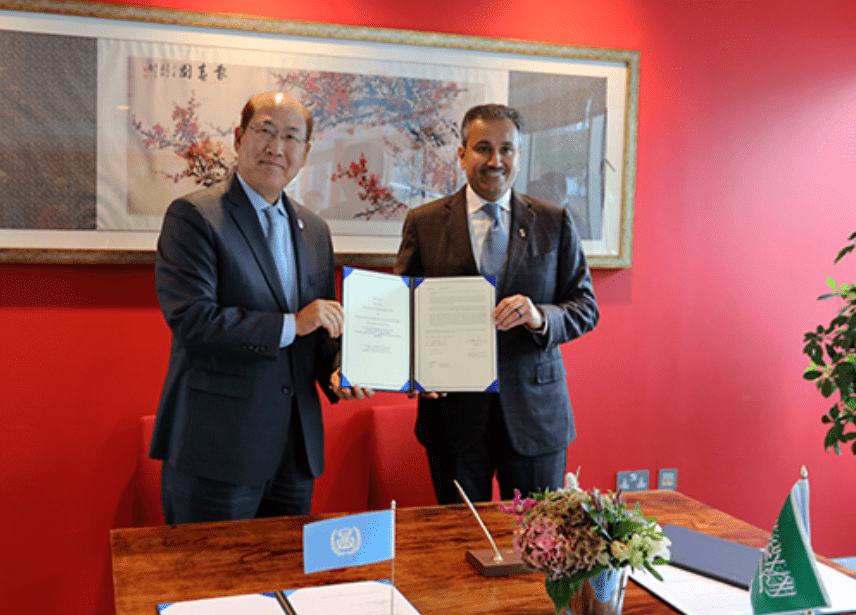The International Maritime Organization (IMO) has signed three partnership agreements with the Kingdom of Saudi Arabia to finance the preparation of a new global project aiming to eliminate emissions related to the shipping industry, as well as existing projects focused on biofouling and marine plastic litter.
“Lowering emissions, reducing marine litter and tackling invasive aquatic species are vital to preserving our oceans, and IMO is committed to a global approach to environmental protection, with capacity building in developing countries to ensure that no Member State is left behind on this important journey,” said IMO’s Secretary-General Kitack Lim.
The three agreements, signed on 28 September, include the three environmental initiatives Coordinated Actions to Reduce Emissions from Shipping (CARES) Project, GloFouling Project and GloLitter Project, amounting to US$509,000 in total.
In particular, under the first agreement, around US$400,000 will be used to fund a 12-month preparatory phase of a new long-term IMO CARES initiative, which intends to accelerate green technologies and their deployment globally in order to facilitate blue economic growth in developing regions.
The preparatory project will lead to the design of the IMO CARES Program and will be executed by IMO’s Department of Partnerships and Projects (DPP).
Furthermore, the IMO CARES Project will build on and complement other ongoing work, including Green Voyage 2050, GHG-Smart Project, the Blue Solutions Project, the Finsmart and the NextGen initiative, which will be connected to various research & development (R&D) and innovation decarbonisation initiatives around the world, according to Jose Matheickal, DPP Chief.
The preparatory phase of IMO CARES is designed to identify various potential key stakeholders for the long-term program, including donors, regional maritime technology cooperation centres, various decarbonisation R&D centres, Global Industry Alliances and financial institutions.
In the meantime, the foundation Project will undertake regional and global consultation workshops to design the key elements and framework of the global program and will maintain a focus on developing countries in order to facilitate the decarbonisation shift.

The agreements will see US$509,000 in funding going to the three environmental initiatives.The second agreement sets out US$54,500 in funding for IMO’s ongoing initiative in partnership with Global Environment Facility (GEF) and United Nations Development Programme (UNDP), called GloFouling Project, to implement the IMO Guidelines for the control and management of ships’ biofouling.
According to a statement, the funding will go towards holding an awareness-raising workshop on ships’ biofouling for women in the Arab States.
Ships’ biofouling is one of the main threats to marine biodiversity as it contributes to increased fuel consumption and consequently to greenhouse gas (GHG) emissions. The environmental impacts are often associated with substantial economic costs.
The workshop will seek to improve awareness and expertise on general aspects of biofouling management to increase the participation of women across maritime industries and administrations. It is expected to create a framework for reducing existing gender disparities in maritime administrations, the scientific community and the private sector.
The event will gather women in maritime administrations, female business entrepreneurs, researchers and representatives from private sector companies, industry associations and the IMO-supported Women in Maritime associations for a review of the biofouling issue and an analysis of solutions required to prevent and manage biofouling.
Regarding the third initiative, IMO-Norway-Food and Agriculture Organization (FAO) GloLitter Project that aims to tackle marine plastic litter, will receive co-financing of US$54,5000 under the agreement with Saudi Arabia.
The GloLitter Project encourages twinning between countries to create a network for the distribution of knowledge about best practices to tackle marine plastic litter, as reducing marine plastic litter which can include discarded items from ships and discarded fishing gear, is vital to safeguard coastal and global marine resources, according to an IMO’s representative.
IMO will prepare a guidance document for twining purposes and then the twinning countries can apply to be nominated as twins together with their specific work plan and related funding support needed.
Under the agreement, the additional funding from the Kingdom of Saudi Arabia will augment the ongoing GloLitter Project by focusing on some of the Lead Partnering Countries (LPC) and twin those with one or more Partnering Country (PC) within the GloLitter network. The funding support will include aspects such as organising workshops and providing expertise.
 Hotline: 0944 284 082
Hotline: 0944 284 082
 Email:
Email: 


 VN
VN